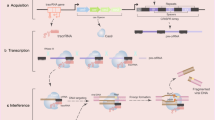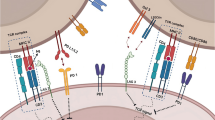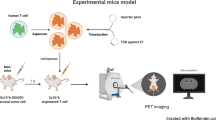Abstract
Gene therapy strategies employing the HSVtk/ganciclovir (GCV) suicide gene offer promising approaches towards the treatment of metastatic breast cancer. These include bystander effects on non-transduced tumor cells, lower systemic toxicity, and the possibility of inducing immunity against the tumor. Previously we have demonstrated the ability of the grp78 stress-inducible promoter to stimulate expression of reporter genes within the tumor microenvironment. However, experimental evidence demonstrating the ability of this promoter to activate therapeutic agents within the breast cancer environment causing tumor eradication is needed prior to clinical trials. In this report, we test the efficacy of the grp78 promoter in a retroviral system to drive the expression of the HSVtk suicide gene in a murine mammary adenocarcinoma cell line (TSA) in syngeneic, immune-competent hosts. Our results show that under glucose-starvation conditions in vitro, the expression of HSVtk and GCV induced cell death are enhanced in tumor cells in which the HSVtk gene is driven by the internal grp78 promoter compared to cells in which the Moloney murine leukemia virus LTR drives HSVtk. In in vivo studies, in tumors in which the HSVtk gene is driven by the grp78 promoter, GCV treatment causes complete tumor eradication, whereas tumors persist when the HSVtk gene is driven by the retroviral LTR. Our study suggests that the grp78 promoter may be useful to enhance the effectivity of therapeutic agents within a breast tumor. In addition, it is shown that immune memory is induced in syngeneic, immune-competent hosts. This new retroviral vector might therefore be useful for breast cancer gene therapy.
Similar content being viewed by others
References
Nanni P, de Giovanni C, Nicoletti G, Landuzzi L, Rossi I, Frabetti F, Giovarelli M, Forni G, Cavallo F, di Carlo E, Musiani P, Lollini PL: The immune response elicited by mammary adenocarcinoma cells transduced with interferon-and cytosine deaminase genes cures lung metastases by parental cells. Hum Gene Ther 9: 217-224, 1998
Freeman SM, Whartenby KA, Freeman JL, Abboud CN, Marrogi AJ: In situ use of suicide genes for cancer therapy. Semin Oncol 23: 31-45, 1996
Moolten FL: Tumor chemosensitivity conferred by inserted herpes thymidine kinase genes: paradigm for a prospective cancer control strategy. Cancer Res 46: 5276-5281, 1986
Barba D, Hardin J, Ray J, Gage FH: Thymidine kinasemediated killing of rat brain tumors. J Neurosurg 79: 729-735, 1993
Kolberg R: Gene therapists test puzzling 'bystander effect'. NIH Res 4: 8-74, 1992
Freeman SM, Abboud CN, Whartenby KA, Packman CH, Koeplin DS, Moolten FL, Abraham GN: The 'bystander effect': tumor regression when a fraction of the tumor mass is genetically modified. Cancer Res 53: 5274-5283, 1993
Link CJ, Jr., Kolb EM, Muldoon RR: Preliminary in vitro ef-ficacy and toxicities studies of the herpes simplex thymidine kinase gene system for the treatment of breast cancer. Hybridoma 14: 143-147, 1995
Singhal S, Kaiser LR: Cancer chemotherapy using suicide genes. Surg Oncol Clin N Am 7: 505-536, 1998
Sterman DH, Treat J, Litzky LA, Amin KM, Coonrod L, Molnar-Kimber K, Recio A, Knox L, Wilson JM, Albelda SM, Kaiser LR: Adenovirus-mediated herpes simplex virus thymidine kinase/ganciclovir gene therapy in patients with localized malignancy: results of a phase I clinical trial in malignant mesothelioma. Hum Gene Ther 9: 1083-1092, 1998
Salmons B, Gunzburg WH: Targeting of retroviral vectors for gene therapy. Hum Gene Ther 4: 129-141, 1993
Kasahara N, Dozy AM, Kan YW: Tissue-specific targeting of retroviral vectors through ligand-receptor interactions. Science 266: 1373-1376, 1994
Clary BM, Lyerly HK: Transcriptional targeting for cancer gene therapy. Surg Oncol Clin N Am 7: 565-574, 1998
Lan KH, Kanai F, Shiratori Y, Ohashi M, Tanaka T, Okudaira T, Yoshida Y, Hamada H, Omata M: In vivo selective gene expression and therapy mediated by adenoviral vectors for human carcinoembryonic antigen-producing gastric carcinoma. Cancer Res 57: 4279-4284, 1997
Ohashi M, Kanai F, Tanaka T, Lan KH, Shiratori Y, Komatsu Y, Kawabe T, Yoshida H, Hamada H, Omata M: In vivo adenovirus-mediated prodrug gene therapy for carcinoembryonic antigen-producing pancreatic cancer. Cancer Res 89: 457-462, 1998
Macri P, Gordon JW: Delayed morbidity and mortality of albumin/SV40 T-antigen transgenic mice after insertion of an a-fetoprotein/Herpes virus thymidine kinase transgene and treatment with ganciclovir. Hum Gene Ther 5: 175-182, 1994
Vile RG, Hart IR: In vitro and in vivo targeting of gene expression to melanoma cells. Cancer Res 53: 962-967, 1993
Dachs GU, Patterson AV, Firth JD, Ratcliffe PJ, Townsend KM, Stratford IJ, Harris AL: Targeting gene expression to hypoxic tumor cells. Nat Med 3: 515-520, 1997
Hallahan DE, Mauceri HJ, Seung LP, Dunphy EJ, Wayne JD, Hanna NN, Toledano A, Hellman S, Kufe DW, Weichselbaum RR: Spatial and temporal control of gene therapy using ionizing radiation. Nat Med 1: 786-791, 1995
Brown JM, Giaccia AJ: The unique physiology of solid tumors: opportunities (and problems) for cancer therapy. Cancer Res 58: 1408-1416, 1998
Lee AS: Coordinated regulation of a set of genes by glucose and calcium ionophores in mammalian cells. Trends Biochem Sci 12: 20-23, 1987
Murphy BJ, Laderoute KR, Short SM, Sutherland RM: The identification of heme oxygenase as a major hypoxic stress protein in Chinese hamster ovary cells. Br J Cancer 64: 69-73, 1991
Sciandra JJ, Subjeck JR, Hughes CS: Induction of glucoseregulated proteins during anaerobic exposure and of heatshock proteins after reoxygenation. Proc Natl Acad Sci USA 81: 4843-4847, 1984
Roy B, Lee AS: The mammalian endoplasmic reticulum stress response element consists of an evolutionarily conserved tripartite structure and interacts with a novel stress inducible complex. Nucleic Acids Res 27: 1437-1443, 1999
Gazit G, Kane SE, Nichols P, Lee AS: Use of the stressinducible grp78/BiP promoter in targeting high level gene expression in fibrosarcoma in vivo. Cancer Res 55: 1660-1663, 1995
Gazit G, Hung G, Chen X, Anderson WF, Lee AS: Use of the glucose-starvation inducible grp78 promoter in suicide gene therapy of murine fibrosarcoma. Cancer Res 59: 3100-3106, 1999
Nanni P, De Giovanni C, Lollini PL, Nicoletti G, Prodi G: TSA: a new metastasizing cell line originated from a BALB/c spontaneous mammary adenocarcinoma. Clin Exp Med 1: 373-380, 1983
Resendez E, Jr., Attenello JW, Grafsky A, Chang CS, Lee AS: Calcium ionophore A23187 induces expression of glucoseregulated genes and their heterologous fusion genes. Mol Cell Biol 5: 1212-1219, 1985
Lyons RM, Forry-Schaudies S, Otto E, Wey C, Patil-Koota V, Kaloss M, McGarrity GJ, Chiang YL: An improved retroviral vector encoding the herpes simplex virus thymidine kinase gene increases antitumor efficacy in vivo. Cancer Gene Ther 2: 273-280, 1995
Hung G, Skotzko MJ, Chang M, Parekh D, Stain SC, Hall FL, Gordon E, Anderson WF: Intratumoral injection of a concentrated antisense cyclin G1 retroviral vector inhibits growth of undifferentiated carcinoma in nude mice. Int J Pediatr Oncol 4: 317-325, 1997
Chang SC, Wooden SK, Nakaki T, Kim YK, Lin AY, Kung L, Attenello JW, Lee AS: Rat gene encoding the 78-kDa glucoseregulated protein GRP78: its regulatory sequences and the effect of protein glycosylation on its expression. Proc Natl Acad Sci USA 84: 680-684, 1987
Zhou Y, Lee AS: Mechanism for the suppression of the mammalian stress response by genistein, an anticancer phytoestrogen from soy. J Natl Cancer Inst 90: 381-388, 1998
Wooden SK, Li LJ, Navarro D, Qadri I, Pereira L, Lee AS: Transactivation of the grp78 promoter by malfolded proteins, glycosylation block, and calcium ionophore is mediated through a proximal region containing a CCAAT motif which interacts with CTF/NF-I. Mol Cell Biol 11: 5612-5623, 1991
Li WW, Alexandre S, Cao X, Lee AS: Transactivation of the grp78 promoter by Ca2+depletion. A comparative analysis with A23187 and the endoplasmic reticulum Ca2+-ATPase inhibitor thapsigargin. J Biol Chem 268: 12003-12009, 1993
Macejak DG, Sarnow P: Internal initiation of translation mediated by the 50 leader of a cellular mRNA. Nature 353: 90-94, 1991
Anderson WF: Human gene therapy. Nature 392(Suppl): 25-30, 1998
Lollini PL, Nanni P: Minimal requirements for characterization of cytokine gene-transduced tumor cells: a proposal. J Natl Cancer Inst 87: 1717-1718, 1995
Palmer TD, Rosman GJ, Osborne WR, Miller AD: Genetically modified skin fibroblasts persist long after transplantation but gradually inactivate introduced genes. Proc Natl Acad Sci USA 88: 1330-1334, 1991
Tong X, Engehausen DG, Freund CT, Agoulnik I, Guo Z, Oehler MK, Kim TE, Hasenburg A, Contant CF, Woo SL, Kieback DG: The efficacy of adenovirus-mediated gene therapy of ovarian cancer is enhanced by using the cytomegalovirus promoter. Anticancer Res 18: 719-725, 1998
Cai JW, Henderson BW, Shen JW, Subjeck JR: Induction of glucose regulated proteins during growth of a murine tumor. J Cell Physiol 154: 229-237, 1993
Hall SJ, Mutchnik SE, Chen SH, Woo SL, Thompson TC: Adenovirus-mediated herpes simplex virus thymidine kinase gene and ganciclovir therapy leads to systemic activity against spontaneous and induced metastasis in an orthotopic mouse model of prostate cancer. Int J Cancer 70: 183-187, 1997
Hall SJ, Sanford MA, Atkinson G, Chen SH: Induction of potent antitumor natural killer cell activity by herpes simplex virus-thymidine kinase and ganciclovir therapy in an orthotopic mouse model of prostate cancer. Cancer Res 58: 3221-3225, 1998
Gagandeep S: Prodrug-activated gene therapy: involvement of an immunological component in the 'bystander effect'. Cancer Gene Ther 3: 83-88, 1996
Ishii-Morita H: Mechanism of 'bystander effect' killing in the herpes simplex thymidine kinase gene therapy model of cancer treatment. Gene Ther 4: 244-251, 1997
Pavlovic J, Nawrath M, Tu R, Heinicke T, Moelling K: Antitumor immunity is involved in the thymidine kinase-mediated killing of tumors induced by activated Ki-ras (G12V). Gene Ther 3: 635-643, 1996
Felzmann T, Ramsey WJ, Blaese RM: Characterization of the antitumor immune response generated by treatment of murine tumors with recombinant adenoviruses expressing HSVtk, IL-2, IL-6 or B7-1. Gene Ther 4: 1322-1329, 1997
Santodonato L, D'Agostino G, Santini SM, Carlei D, Musiani P, Modesti A, Signorelli P, Belardelli F, Ferrantini M: Local and systemic antitumor response after combined therapy of mouse metastatic tumors with tumor cells expressing IFN-α and HSVtk: perspectives for the generation of cancer vaccines. Gene Ther 4: 1246-1255, 1997
Vile RG, Castleden S, Marshall J, Camplejohn R, Upton C, Chong H: Generation of an anti-tumour immune response in a non-immunogenic tumour: HSVtk killing in vivo stimulates a mononuclear cell infiltrate and a Th1-like profile of intratumoural cytokine expression. Int J Cancer 71: 267-274, 1997
Author information
Authors and Affiliations
Rights and permissions
About this article
Cite this article
Chen, X., Zhang, D., Dennert, G. et al. Eradication of murine mammary adenocarcinoma through HSVtk expression directed by the glucose-starvation inducible grp78 promoter. Breast Cancer Res Treat 59, 81–90 (2000). https://doi.org/10.1023/A:1006398918227
Issue Date:
DOI: https://doi.org/10.1023/A:1006398918227




